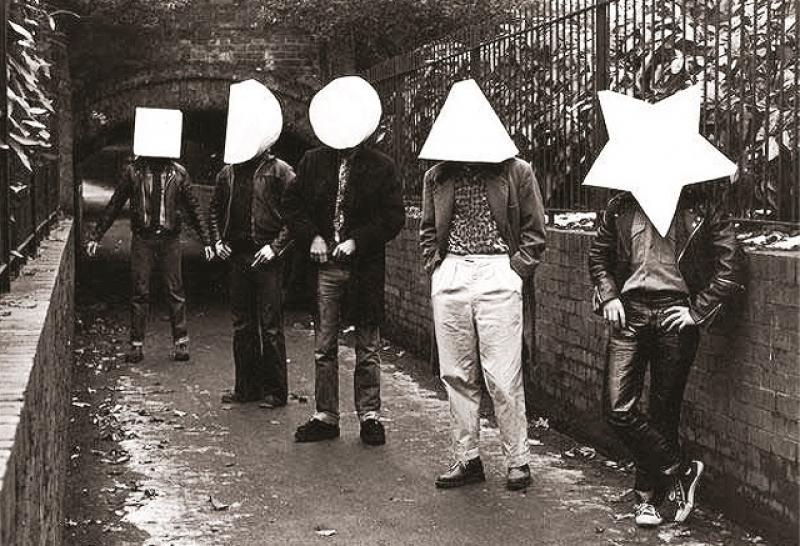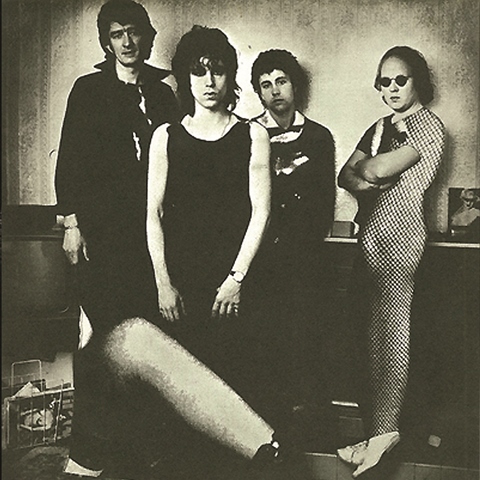Reissue CDs Weekly: Action Time Vision | reviews, news & interviews
Reissue CDs Weekly: Action Time Vision
Reissue CDs Weekly: Action Time Vision
Thought-provoking box set dedicated to British independent-label punk rock

Sixty-eight tracks into the intriguing Action Time Vision, orthodoxy suddenly gives way to individualism. The two-and-bit discs so far have mostly showcased what passes for notions of punk rock: block-chord guitars, guttersnipe vocals, Ramones-speed rhythms and Clash-style terrace-chant choruses. Suddenly, The Fall’s lurching “Psycho Mafia” suggests the early punk era was not about trying to be same as every other band. Individualism was possible.
Recorded in 1977, but issued in 1978, “Psycho Mafia” was from The Fall’s first record, an EP on the Step Forward label. Other bands on the imprint included Chelsea and The Cortinas, also heard on Action Time Vision. Both debuted with recognisably punky singles but, despite sharing the same continuum, The Fall had no time for received musical templates.
 Action Time Vision – its title taken from the Alternative TV single – charts this irregular world over four CDs. The full title is Action Time Vision: A Story of Independent UK Punk 1976–1979. The years covered have been endlessly raked over, but the focus here is independent-label releases rather than tracks issued by CBS, EMI or Virgin. No Clash or Sex Pistols, then. In truth, very few bands clinging to the familiar brutalist punk style were signed by the majors. The Vibrators maybe fit the bill (they signed with Epic in 1977) as do Polydor's The Jolt, MCA's London and Sham 69 (who signed with Polydor in late 1977).
Action Time Vision – its title taken from the Alternative TV single – charts this irregular world over four CDs. The full title is Action Time Vision: A Story of Independent UK Punk 1976–1979. The years covered have been endlessly raked over, but the focus here is independent-label releases rather than tracks issued by CBS, EMI or Virgin. No Clash or Sex Pistols, then. In truth, very few bands clinging to the familiar brutalist punk style were signed by the majors. The Vibrators maybe fit the bill (they signed with Epic in 1977) as do Polydor's The Jolt, MCA's London and Sham 69 (who signed with Polydor in late 1977).
Apart from brand leaders The Clash and Sex Pistols, the majors went for bands potentially marketable to mainstream rock fans or a pop audience (like The Rezillos and Undertones – both picked up by Sire following independent releases). The corporate labels went for bands like The Stranglers and The Jam, ones not tied to what might be a passing fad and were not strictly punk: ones which might have a shelf life to repay any investment. A Story of Independent UK Punk is, thus, a tautology: the labels putting out 99 per cent of punk were independent. The title could as well be the less marketable “A Story of Punk”.
Everything expected is here. Eater, The Lurkers and Some Chicken rub shoulders with Cockney Rejects, Peter & The Test Tube Babies and Vice Squad. The track selection is diligent but raises questions addressed below. There are obscurities which have never before been on CD and barely heard of bands like Scotland’s Fire Exit. The case-bound package houses four CDs with 111 tracks and a book. There is track-by-track annotation and an introductory essay.
Manchester should have been better represented on 'Action Time Vision'Musically, Action Time Vision is a non-stop blast. The opening cut is The Damned’s “New Rose”, British punk’s first single, and their label Stiff’s debut release. Humour is highlighted. “Wot’s for Lunch Mum? (not B****s Again)” by Leamington Spa’s Shapes remains hilarious with its howl of frustration about endlessly being served baked beans. With its acerbity, ‘O’ Level’s “Pseudo Punk” is also still amusing. More serious outings excite. Joy Division’s “Failures” is more powerful than less passionate bands which also chose to work their guitars hard. The outstanding “New Way”, by The Wall, presages the textural approach of The Chameleons. As it was for The Fall, punk was a jumping off point.
As well as the music as a springboard, Action Time Vision charts decentralisation. The tracks are sequenced in order of release and, as the discs progress, the London representatives become fewer and fewer. Manchester, Britain’s second city of punk, gets a raw deal though. Buzzcocks' Spiral Scratch EP was an inspirational release as it showed how it could be done for yourself. It was also the first punk record from Manchester. Though the EP is mentioned in the introductory essay, a track from it is not collected and it is not said why. Manchester’s next punk release, Slaughter & The Dogs’ “Cranked up Really High”, is also not included. The first Manchester submission is The Panik’s “Modern Politics”. Taking issue with the tracks on a compilation is part of the fun, but the city should have been better represented.
A definition of punk is lackingThe Users’ debut single “Sick of you” would have been a better choice than their weaker second single “Kicks in Style”. That, though, is a matter of taste. In contrast to matters of taste and additional to the downplaying of Manchester, another genuinely problematic factor is the assertion in the introductory essay that “the UK indie scene was spearheaded by Stiff.” Not so. Setting aside the scads of independent folk, jazz and reggae labels pre-dating punk, Stiff’s competitor London-based label Chiswick issued its first record in November 1975. Stiff’s first arrived in August 1976. Furthermore, Chiswick tried to sign The Damned in July 1976 when they paid for their first demos to be recorded, although the band went on to sign with Stiff. Chiswick was on the case before Stiff.
Fast and loose treatment is also doled out to the concept of independent. United Artists' band The Maniacs are heard: the label’s records were pressed and distributed by EMI. Ghetto Rockers, The Snivelling Shits’ label, was a subsidiary of Island. And it’s hard to see why the Pye Records-backed DJM, whose Satan’s Rats are compiled, is represented. A definition of independent (beyond saying it was “starting your own label”) is lacking, as is one of punk. What each means for Action Time Vision should have been clarified.
 The bands played fast and loose too. The Vacants were a cash-in outfit featuring a member of Sixties' R&B band The Downliners Sect. The UK Subs were a contemporary R&B combo which went punk. Every member of the not-really-punk The Only Ones (pictured left) had an extensive musical past (which, kudos to them, they did not hide). Others similarly hitched themselves to punk and swiftly moved on. For Gary Numan’s Tubeway Army, punk was a handy flag of convenience.
The bands played fast and loose too. The Vacants were a cash-in outfit featuring a member of Sixties' R&B band The Downliners Sect. The UK Subs were a contemporary R&B combo which went punk. Every member of the not-really-punk The Only Ones (pictured left) had an extensive musical past (which, kudos to them, they did not hide). Others similarly hitched themselves to punk and swiftly moved on. For Gary Numan’s Tubeway Army, punk was a handy flag of convenience.
American band Pure Hell should not be here. Even though their lone single was issued by a British label, they are not a UK band. As for The Hollywood Brats, they had long-expired by the time punk came along and their music was first heard via the subsequent release of shelved material recorded when long hair, platform boots and pretending to be The New York Dolls ruled. But that’s punk, isn’t it? A great big wodge of chaos. Possibly.
And perhaps it is a bit cheeky to support the title by including only two tracks from 1976: The Damned’s “New Rose” and Eater’s “Outside View” (recorded in 1976 but issued in 1977). Then again, what else recorded in 1976 could have been included? Nothing. Apart from the four tracks on Buzzcocks’ Spiral Scratch, nothing else fitting the bill was recorded then. But 1976 is when punk began, so that’s what the title uses.
In the end, Action Time Vision succeeds as it is a hodgepodge: a verité collection as disordered as the times chronicled. Get this, and start with disc three as it thrillingly documents boundaries as they were broken. Action Time Vision will start arguments, but won’t settle them.
Share this article
The future of Arts Journalism
You can stop theartsdesk.com closing!
We urgently need financing to survive. Our fundraising drive has thus far raised £49,000 but we need to reach £100,000 or we will be forced to close. Please contribute here: https://gofund.me/c3f6033d
And if you can forward this information to anyone who might assist, we’d be grateful.

Subscribe to theartsdesk.com
Thank you for continuing to read our work on theartsdesk.com. For unlimited access to every article in its entirety, including our archive of more than 15,000 pieces, we're asking for £5 per month or £40 per year. We feel it's a very good deal, and hope you do too.
To take a subscription now simply click here.
And if you're looking for that extra gift for a friend or family member, why not treat them to a theartsdesk.com gift subscription?
more New music
 Moroccan Gnawa comes to Manhattan with 'Saha Gnawa'
Trance and tradition meet Afrofuturism in Manhattan
Moroccan Gnawa comes to Manhattan with 'Saha Gnawa'
Trance and tradition meet Afrofuturism in Manhattan
 Soulwax’s 'All Systems Are Lying' lays down some tasty yet gritty electro-pop
Belgian dancefloor veterans return to the fray with a dark, pop-orientated sound
Soulwax’s 'All Systems Are Lying' lays down some tasty yet gritty electro-pop
Belgian dancefloor veterans return to the fray with a dark, pop-orientated sound
 Music Reissues Weekly: Marc and the Mambas - Three Black Nights Of Little Black Bites
When Marc Almond took time out from Soft Cell
Music Reissues Weekly: Marc and the Mambas - Three Black Nights Of Little Black Bites
When Marc Almond took time out from Soft Cell
 Album: Mobb Deep - Infinite
A solid tribute to a legendary history
Album: Mobb Deep - Infinite
A solid tribute to a legendary history
 Album: Boz Scaggs - Detour
Smooth and soulful standards from an old pro
Album: Boz Scaggs - Detour
Smooth and soulful standards from an old pro
 Emily A. Sprague realises a Japanese dream on 'Cloud Time'
A set of live improvisations that drift in and out of real beauty
Emily A. Sprague realises a Japanese dream on 'Cloud Time'
A set of live improvisations that drift in and out of real beauty
 Trio Da Kali, Milton Court review - Mali masters make the ancient new
Three supreme musicians from Bamako in transcendent mood
Trio Da Kali, Milton Court review - Mali masters make the ancient new
Three supreme musicians from Bamako in transcendent mood
 Hollie Cook's 'Shy Girl' isn't heavyweight but has a summery reggae lilt
Tropical-tinted downtempo pop that's likeable if uneventful
Hollie Cook's 'Shy Girl' isn't heavyweight but has a summery reggae lilt
Tropical-tinted downtempo pop that's likeable if uneventful
 Pop Will Eat Itself's 'Delete Everything' is noisy but patchy
Despite unlovely production, the Eighties/Nineties unit retain rowdy ebullience
Pop Will Eat Itself's 'Delete Everything' is noisy but patchy
Despite unlovely production, the Eighties/Nineties unit retain rowdy ebullience
 Music Reissues Weekly: The Earlies - These Were The Earlies
Lancashire and Texas unite to fashion a 2004 landmark of modern psychedelia
Music Reissues Weekly: The Earlies - These Were The Earlies
Lancashire and Texas unite to fashion a 2004 landmark of modern psychedelia
 Odd times and clunking lines in 'The Life of a Showgirl' for Taylor Swift
A record this weird should be more interesting, surely
Odd times and clunking lines in 'The Life of a Showgirl' for Taylor Swift
A record this weird should be more interesting, surely

Add comment